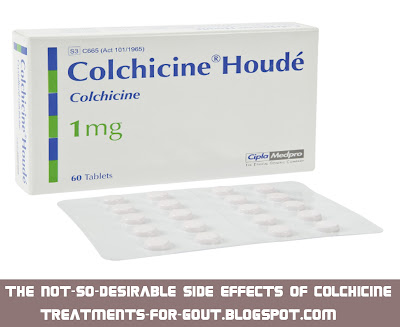Colchicine is a drug used for gout attacks, as it reduces the inflammation brought by the presence of uric acid crystals that are formed in the joints but just like any other drug, there are known side effects of Colchicine.
Colchicine, when used to patients with gout, interrupts the uric acid crystal deposition cycle in joint tissues, the cycle which would lead to an inflammatory response and cause an acute gout attack. Colchicine decreases the movement toward or away from a chemical stimulus and ingestion of foreign bodies which stops the formation and release of a chemotactic glycoprotein that is produced during the ingestion of urate crystals.
However, the anti-inflammatory effect of colchicine also comes with undesirable effects. The following may or may not occur to each individual. The most common side effects of colchicine to your body are:
- Mild stomach pain
- Mild nausea or vomiting or
- Mild diarrhea
Allergic reactions may also occur that would need immediate medical attention:
- Difficulty in breathing
- Rashes
- Swelling of your face, lips, tongue, or throat
You need to call your doctor once the following serious side effects would occur:
- Severe vomiting or diarrhea
- Muscle pain or weakness
- Unusual bruising or bleeding
- Numbness/tingling in your fingers or toes
- Presence of any signs of infection (fever, chills, body aches)
- Pale or gray appearance of your lips, tongue, or hands
- Urinating less than the usual (or not at all).
Your doctor will definitely explain to you the pros and cons of using colchicine. As long as the medicine’s benefits far outweigh its side effects, your doctor will most likely continue to prescribe you such medication. Other side effects of colchicine that have occurred to some patients during their long-term therapy are:
* Dermatologic : Hives and hair loss
* Gastrointestinal tract : Loss of appetite, electrolyte disturbance, paralytic ileus and pancreatitis; presence of excess fat in feces and prevention of an enzymic process to decrease the rate of the enzymic reaction have also been reported in patients on long-term colchicine use.
* Respiratory : Adult respiratory distress syndrome.
* Hematologic : Thrombocytopenia (an abnormal decrease in the number of platelets in circulatory blood), pancytopenia (an abnormal deficiency in all blood cells: red blood cells and white blood cells and platelets), leukopenia (an abnormally low number of white blood cells in the circulating blood), agranulocytosis (a sharp drop in circulating granular white blood cells), bone marrow failure, bone marrow depression, disseminated intravascular coagulation, and aplastic anemia.
* Musculoskeletal : myopathy (disease of muscle or muscle tissue) , neuropathy (disease or abnormality of the nervous system) , and paralysis.
* Nervous system : Colchicine-induced neuromyopathy.
* Genitourinary : May affect the production of sperm cells for males.
* Renal : Acute renal failure and rapid progressive glomerulonephritis in rare cases.
In every medicine, undesirable effects always come along with the desirable effects, but not all unwanted effects would necessarily occur to all individuals. It is important that you discuss your medical concerns with your doctor so he can openly discuss the possible colchicine side effects to your body. After all, it is still best to be personally advised by a known physician.

